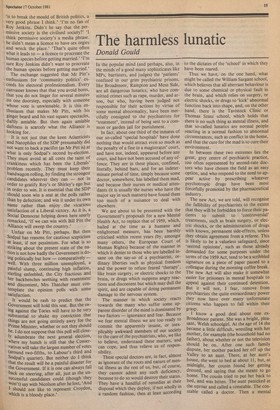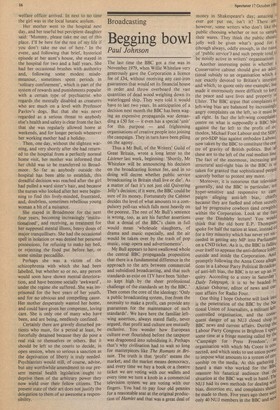The harmless lunatic
Donald Gould
In the popular mind (and perhaps, also, in the minds of a good many sophisticates like MPs, barristers, and judges) the 'patients' confined in our grim psychiatric prisons, like Broadmoor, Rampton and Moss Side, are all dangerous lunatics, who have committed crimes such as rape, murder, and arson, but who, having been judged not responsible for their actions by virtue of some mental abnormality, have been mercifully consigned to the psychiatrists for `treatment', instead of being sent to a common or garden jail for punishment.
In fact, about one third of the inmates of our so-called `special hospitals' have done nothing that would attract even so much as the penalty of a fine in a magistrates' court, and have not, indeed, appeared before any court, and have not been accused of any offence. They are in these places, confined, literally, behind bars, and for an indeterminate period of time, simply because some doctor, somewhere, has labelled them mad, and because their nurses or medical attendants (it is usually the nurses who have the major say in such matters) have found them too much of a nuisance to deal with elsewhere.
We are about to be presented with the Government's proposals for a new Mental Health Act, to replace that of 1959, which, hailed at the time as a humane and enlightened measure, has been harshly criticised within recent years (by, amongst many others, the European Court of Human Rights) because of the manner in which it denies to those who are labelled insane on the say-so of a psychiatrist, ordinary liberties such as physical freedom and the power to refuse feared 'therapy', like brain surgery, or electric shocks to the brain, or drugs which suppress angry reactions and discontent but which may dull the spirit, and are capable of doing permanent damage to the nervous system.
The manner in which society reacts towards the many who suffer some apparent disorder of the mind is dominated by two factors — ignorance and fear. Because we fear mental illness we are too ready to commit the apparently insane, or inexplicably awkward members of our society to the care of the psychiatrists, who, we like to believe, understand these matters, and can cope, and thus relieve us of responsibility. These special doctors are, in fact, almost as ignorant of the roots and nature of mental illness as the rest of us, but, of course, they cannot admit any such deficiency, because to do so would destroy their status. They have a handful of remedies at their disposal which they deploy, if not wholly in a random fashion, then at least according to the dictates of the `school' in which they have been reared.
Thus we have, on the one hand, what might be called the William Sargant school, which believes that all aberrant behaviour is due to some chemical or physical fault in the brain, and which relies on surgery, or electric shocks, or drugs to 'kick' abnormal function back into shape, and, on the other hand, there is the Tavistock Clinic or Thomas Szasz school, which holds that there is no such thing as mental illness, and that so-called lunatics are normal people reacting in a normal fashion to abnormal circumstances, such as conflict in the home, and that the cure for the mad is to cure their environment.
In between these two extremes lies the great, grey centre of psychiatric practice, too often represented by second-rate doctors who have chosen the field as an easy option, and who respond to the need to appear active by prescribing whatever psychotropic drugs have been most forcefully promoted by the pharmaceutical industry.
The new Act, we are told, will recognise the fallibility of psychiatrists to the extent that they will be forbidden to force their patients to submit to 'controversial' treatments, such as brain surgery, or electric shocks, or the administration of drugs with known, permanent side-effects, unless they obtain agreement from a referee. This is likely to be a valueless safeguard, since 'second opinions', such as those already demanded for some purposes under the terms of the 1959 Act, tend to be a scribbled signature on a piece of paper passed to a colleague during the morning coffee break. The new Act will also make it somewhat easier for prisoners in mental hospitals to appeal against their continued detention. But it will not, I fear, remove from psychiatrists the quite extraordinary power they now have over many unfortunate citizens who happen to fall within their grasp.
1 know a good deal about one exBroadmoor patient. She was a bright, pleasant, Welsh schoolgirl. At the age of 14 she became a little difficult, wrestling with her mother, for example (the household had no father), about whether or not the television should be on. After one such family dispute, her mother packed her off up the Valley to an aunt. There, at her aunt's house, she went to bed at about 11, but, at midnight, her cousin found her getting dressed, and saying that she meant to go home. The cousin tried to put her back to bed, and was bitten. The aunt panicked at the uproar and called a constable. The constable called a doctor. Then a mental welfare officer arrived. In next to no time the girl was in the local lunatic asylum.
Her mother went to the hospital next day, and her tearful but percipient daughter said: 'Mummy, please take me out of this place. I'll be here for the rest of my life if you don't take me out of here.' In the event, and following that brief, hysterical episode at her aunt's house, she stayed in the hospital for two and a half years. She had her occasional brushes with authority and, following some modest misdemeanour, sometimes spent periods in 'solitary confinement', which is part of the system of rewards and punishments popular with a certain type of psychiatrist who regards the mentally disabled as creatures who are much on a level with Professor Pavlov's dogs. But that she was never regarded as a serious threat to anybody else's health and safety is clear from the fact that she was regularly allowed home at weekends, and for longer periods whenever her working mother had a holiday.
Then, one day, without the slightest warning, and very shortly after she had returned to the hospital from a perfectly normal home visit, her mother was informed that her child was to be transferred to Broadmoor. So far as anybody outside the hospital has been able to establish, this dreadful decision was reached after the girl had pulled a ward sister's hair, and because the nurses who looked after her were beginning to find this lively-minded, frustrated, and, doubtless, sometimes rebellious young woman a bit of a nuisance.
She stayed in Broadmoor for the next four years, becoming increasingly 'institutionalised', and receiving, as treatment for her supposed mental illness, heavy doses of major tranquillisers. She had the occasional spell in isolation or was denied her personal possessions, for refusing to make her bed, or rejecting the food put before her, or some similar peccadillo.
Perhaps she was a victim of the schizophrenia with which she had been labelled, but whether so or no, any person would soon have shown mental deterioration, and have become socially 'awkward', under the regime she suffered. She was imprisoned for the best years of her youth, and for no obvious and compelling cause. Her mother desperately wanted her home, and could have given her competent, loving care. She is only one of many who have been, and are being, needlessly confined.
Certainly there are gravely disturbed patients who must, for a period at least, be forcefully detained because they do pose a real risk to themselves or others. But it should be left to the courts to decide, in open session, when so serious a sanction as the deprivation of liberty is truly needed. Psychiatrists would still, of course, advise, but any worthwhile amendment to our present mental health legislation ought to deprive them of the arbitrary power they now wield over their fellow citizens. The present state of their art does not justify the delegation to them of so awesome a responsibility.







































 Previous page
Previous page